High contrast is one of the main advantages that OLED monitors have in the display wars, but now Panasonic has managed to squeeze a comparable contrast ratio out of an In-Plane Switching (IPS) LCD panel. Boasting a contrast ratio of 1,000,000:1, the new panel can display High Dynamic Range (HDR) content and is intended for use in video production, broadcasting, medical and automotive monitors – at least initially.
As sharp and bright as an LCD screen can look, contrast has always been the technology's Achilles' heel. That's because the entire display is backlit, which can wash out the black parts of a scene into a dark grey. OLED displays overcome that issue by removing the constant white LED backlight and replacing it with individually-tuneable "pixels" – the organic light-emitting diodes that make up its acronym.
Unlike LCDs, these OLED displays can achieve true blacks, by simply switching off the pixels in dark sections. That gives them a so-called "infinite" contrast ratio, but many companies quantify it at about 1,000,000:1. Quantum dot displays average about the same.

Now, Panasonic claims it has achieved comparable performance with an IPS LCD monitor that boasts a contrast ratio 600 times that of the company's existing IPS LCD products, which have a ratio of 1,800:1. To achieve this, Panasonic has integrated light-modulating cells into the display cells, which are able to control the level of the backlight's intensity on a pixel-by-pixel basis. The result is an HDR-ready panel with a 1,000,000:1 contrast ratio and a maximum brightness of 1,000 cd/m2 that can be manufactured using existing LCD manufacturing facilities.
The company will initially target the new panel at high-end monitors in fields such as broadcasting, video production, automotive and medical, but the technology could eventually make its way into consumer products as the technology matures and prices come down.
There's no word on pricing just yet, but Panasonic says sample shipments of its new IPS LCD displays will begin in January 2017.
Source: Panasonic




